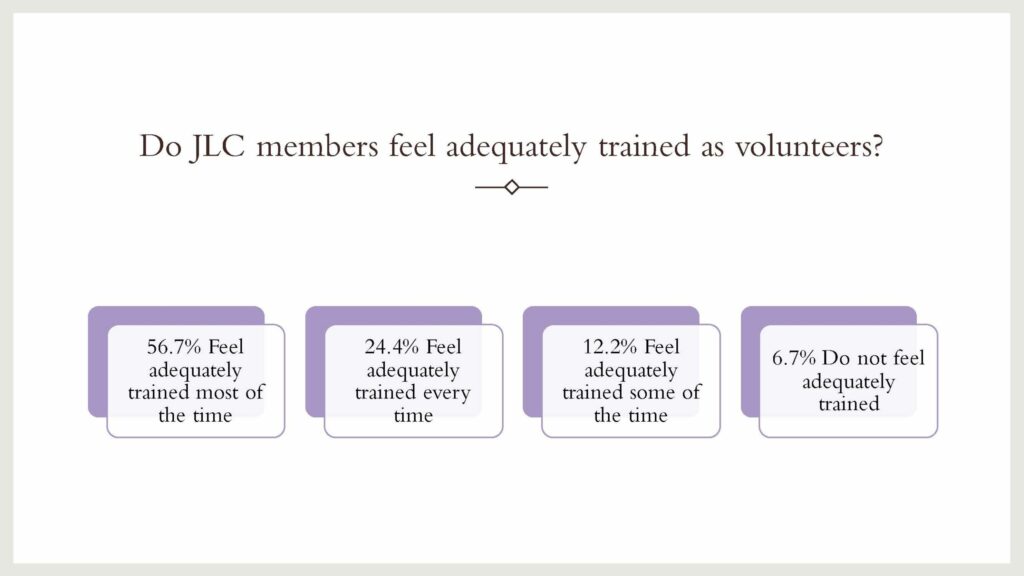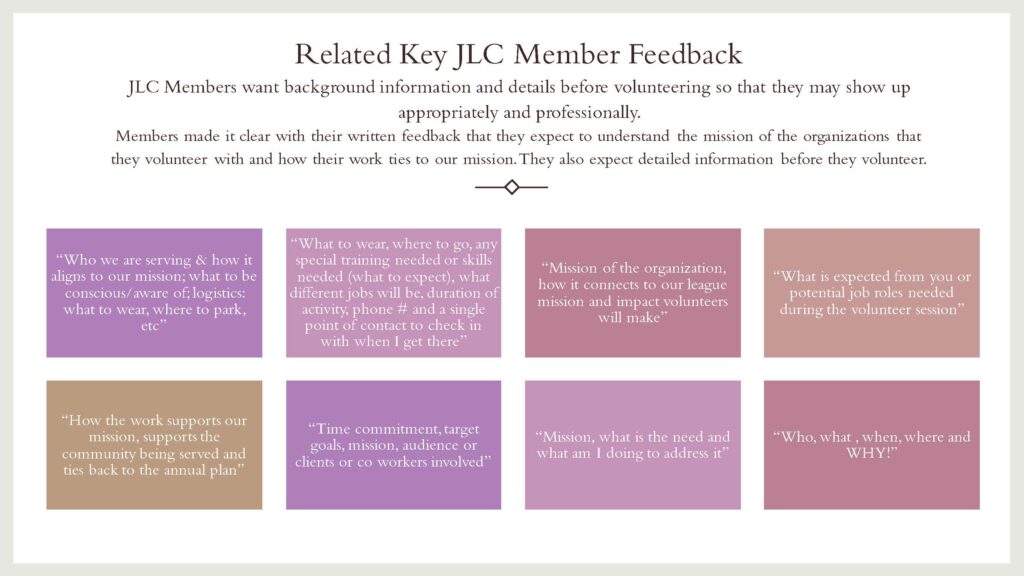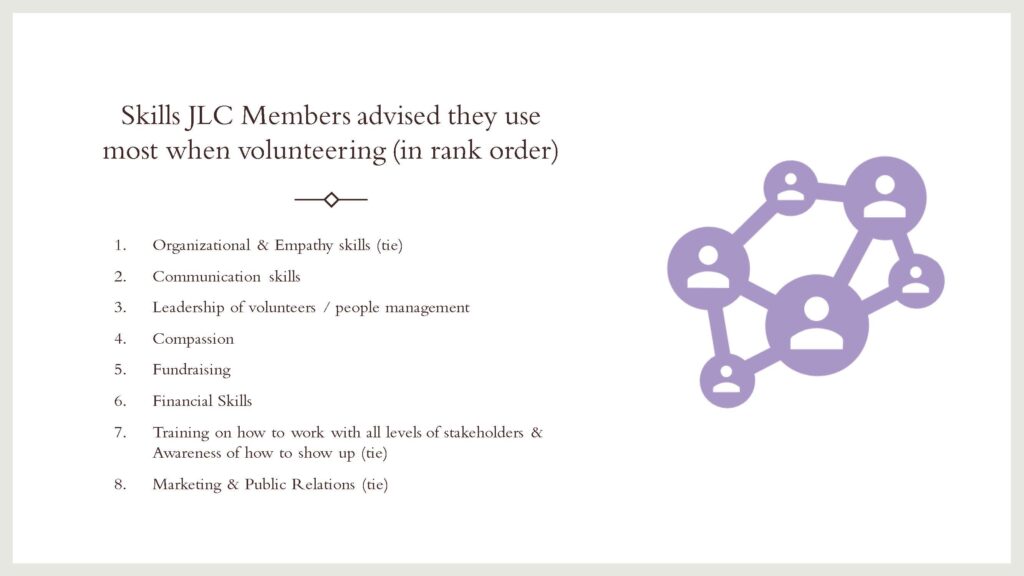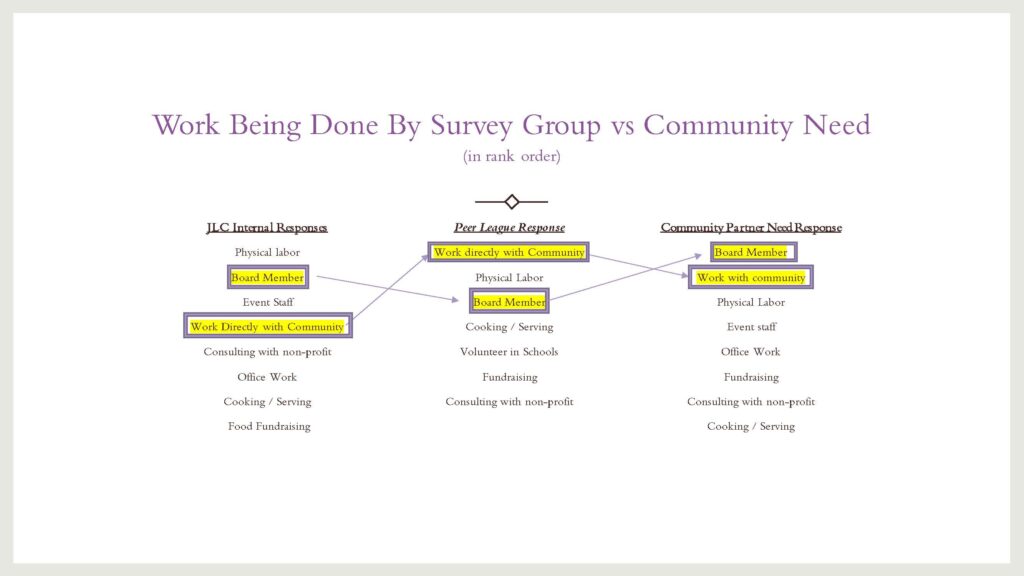2022-2023 Ad Hoc on Training Year-End Summary and Recommendations
Written by the Ad Hoc Committee on Training
Over the course of the 2022-2023 league year, an ad-hoc committee was charged with identifying and understanding what, if any, changes should be made to our current league training to keep us true to our mission. The key driving question being “Does the training we currently offer support our mission of producing best-in-class, powerful community leaders?” It was important to our committee that our process be data driven and that our final recommendations not be assumption based. To accomplish this goal, we took a multifaceted approach to collecting data and feedback from several sources. We looked introspectively at what training looks like in the JLC today by directly solici9ng individual member feedback and feedback from league leaders. We explored who receives training, on what, how and when. We partnered with twenty-five non-profit community partners to get their feedback on what kind of training their volunteers – our members – need to have to best serve them and the community. We also worked with twenty-seven peer large leagues from across the country to learn what they do to facilitate training for their members. From all of this, ultimately, the goal was to take all the data and feedback received to make fact-based recommendations to the Executive Team and Board on how we can improve our training in the future. A full copy of our findings and recommendations can be accessed here. We encourage you to review it. It is very interesting!
When surveying JLC membership, a little over half of those who responded said they felt adequately trained most of the 9me. Only about a quarter of the membership responded that they felt adequately trained all the 9me, showing there is opportunity for improvement. Members overwhelmingly responded that the JLC is where they find their volunteer opportunities. Members also provided a long list of other local community organizations that also offer valuable training opportunities that we may can explore further to learn more. Members made it clear in their feedback that they want to be prepared for every volunteer opportunity and want to understand how the work they are doing 9es to our mission. We are not consistently accomplishing that goal so there is room for improvement on this too.


We researched both the training wants of our members and the training needs of our members. To unpack this further we asked about the types of trainings our members want as well as which skills they use or need most when serving as community volunteers. Interestingly, there are not always the same. This is something we found we have in common with other peer large leagues. Leagues across the country told us they are also working to balance the training wants of members which is a mix of community service skill training and personal & professional development opportunities. An example of the nuanced difference would be fundraising training and resume and headshot workshops. While these training opportunities appear different in focus ultimately both opportunities work in unison toward the singular mission of providing best in class community leaders. The personal development trainings are also some of our most highly attended events of the league year, so we know they are important to keep. Working to find the right mix of trainings for membership is something we did well this year and something our own league also constantly works to improve.

Externally, 90% of the twenty-five community partners interviewed were satisfied with their experience with JLC and spoke highly of us. While the overall impression of our league is very posi9ve there are a few areas where we can improve. One key finding that stood out is the type of work we typically do when we volunteer with our community versus the work our community needs us to do is not aligned. We are out of alignment from the work our peer leagues are doing in their communities as well. This is an area that it is important to draw aBen9on to. To best serve our community, we need to focus on training opportunities to correct this.

In our full presentation to the Executive Team and the Board we discussed several recommendations for consideration, and they have taken this information under advisement for the next league year. We encourage you to view the full presentation for more details. A few key topics we discussed included what does it mean to be a “trained Junior League of Cincinnati volunteer?” how do we balance training wants and needs or members, what does it mean to be a training organization recognizing and how can we leverage skills of members that are trained in certain areas to train other members? We also recommended looking at some of our most popular events – events that were focused on the development and well-being of our members. These personal and professional development events, in addition to the volunteer training, are very popular with our members and should be continued. Finally, another recommendation is to offer training on how to better prepare members for volunteer opportunities as well as information on how to show up for various volunteer opportunities with our community partners.
Moving forward, our committee will be working with the league leadership team as they work to build training recommendations into the strategic plan, as well as assis9ng in building a roadmap for implementation for any training changes they adopt. As we move into the implementation phase, our committee continues to welcome any feedback that members would like to offer – it will only help us provide better training opportunities that members are looking for from being a JLC member.
To view a full copy of the final presentation, follow this link.


